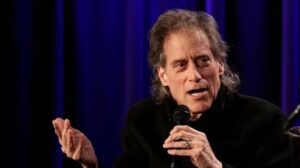
I was saddened to hear of the death this week of Richard Lewis, a one-of-a-kind comedian.
While there are a slew of comics who copied the styles of Jerry Seinfeld’s observations, Sam Kinison’s screaming, and Robert Klein’s intelligence, I have never seen anyone get on stage and do an act like Richard’s. Even if someone tried to reproduce his material, it would sound false because only he could make it work.
In addition to his standup work, Richard was a gifted actor, as he proved opposite Jamie Lee Curtis in the ABC sitcom “Anything But Love,” which ran from 1989 to 1992. In recent years, he was a regular on “Curb Your Enthusiasm” playing essentially himself. No one — with the possible exception of the late Bob Einstein — was better at standing toe to toe while bickering with Larry David than Richard. Even then, you could tell they loved each other.
When I heard the news of Richard’s fatal heart attack, two memories of encounters I had with him many years ago came flooding back.
Before “Anything But Love” got off the ground in the late 1980s, Richard guested on my morning radio show in Washington, DC, to promote his appearance at a local comedy club. His popularity had grown enormously over that decade because he’d made dozens of appearances on David Letterman’s “Late Night” on NBC.
When he walked into my studio, and from the moment I turned on his microphone, he treated me as if we had known each other for a long time. Several listeners told me later they thought from the tone of our conversation Richard and I were old friends. That was entirely because of him being not just hysterical, but warm and approachable.
I didn’t see him again until 1995. By then, Richard had graduated from clubs to theaters, and returned to my show because he was in town for a standup comedy competition at Constitution Hall. He wasn’t a contestant, he was the headliner who would close the show after the amateurs had all done their short sets. I was going to be the emcee.
That morning, I greeted Richard and asked how he felt. With a big grin, he replied, “Great, because today marks one year I’ve been sober!” That led us into something I hadn’t expected, a conversation about his years addicted to booze and drugs. As he weaved through stories about his experiences and recovery, he opened up so completely I just stood back and let him go. It wasn’t the sort of thing he talked about on stage, but it was fascinating and funny.
That night, he and I chatted some more backstage at Constitution Hall as he taped together his handwritten pages of topics he might cover when it was his turn at the microphone. Then he folded them neatly and asked me to come back after my opening bit to give him a read on the crowd. I did, and told him they seemed a bit wary, unsure whether the other performers would be up to the task before he got out there. He said, “At some point, you’ll have to explain to them that I’m the one who’s supposed to be a nervous wreck on stage!”
For some reason, the promoters had booked a very bad female vocal group to perform between the competition portion and Richard’s set. To make matters worse, there was at least a 15-minute delay while the band got set up, including roadies doing a sound check of the drums. As that was happening, the promoter walked up to me and said, “You have to go out there and keep the crowd engaged!” Before I could answer, Richard said, “No, he doesn’t. You’re already killed whatever momentum this show had, and there’s nothing Paul can do to get it back. Just get this over with and then let me go to work.” As the promoter walked away, I thanked Richard for saving me, to which he responded, “I don’t know why either of us is here tonight.”
When the ladies had sung their three songs, I walked back out to the microphone and gave Richard the shortest introduction I could think of: “Now it’s time for an actual professional comedian. Ladies and gentlemen, Richard Lewis!” The crowd leapt to their feet as he strode onstage, shook my hand theatrically, carefully unfolded his blanket-sized paper quilt of material on the piano, and began an hour-long monologue that killed.
That’s how I’ll remember him, as a man who turned his neuroses into an act that made lots of people smile.
